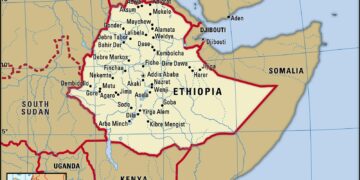In a significant step towards enhancing higher education in Ethiopia, the U.S. Embassy in Addis Ababa has partnered with the Ethiopian Academy of Science to launch a groundbreaking workshop focused on university autonomy. This initiative, aimed at empowering universities to operate with greater independence and academic freedom, brings together scholars, policymakers, and educational leaders to discuss strategies for fostering an environment conducive to innovation and research. As Ethiopia seeks to strengthen its educational frameworks in alignment with international standards, this workshop marks a pivotal moment in the country’s ongoing commitment to educational reform. By promoting autonomy in universities,the U.S. Embassy and the Ethiopian Academy of Science are not only addressing the immediate needs of the educational sector but are also contributing to the broader goal of economic and social progress in the region.
U.S. Embassy and Ethiopian Academy of Science Unite for Academic Empowerment

The recent collaboration between the U.S. Embassy and the Ethiopian Academy of Science marks a significant stride towards enhancing the landscape of higher education in Ethiopia.The workshop focused on the critical theme of university autonomy, aiming to empower academic institutions to develop their own governance frameworks. Participants engaged in dynamic discussions on the importance of independence in curriculum development, administrative decision-making, and financial management. Noteworthy topics covered included:
- strengthening Governance: Encouraging universities to adopt transparent and effective governance structures.
- Curriculum Ownership: Promoting the creation of localized academic programs that reflect the cultural and societal needs of Ethiopia.
- Financial Independence: Exploring avenues for universities to secure funding beyond government allocations.
In addition to interactive sessions, the workshop featured keynote speeches from leading scholars and policymakers, who shared best practices from around the world. A panel discussion allowed participants to voice their concerns and aspirations regarding the future of academic freedom in the region. As part of the initiative, a commitment to establishing a mentorship program was proposed, aimed at fostering collaboration between established universities and emerging institutions. The workshop serves as a foundation for ongoing dialog and action in the pursuit of a more autonomous and empowered academic environment in Ethiopia.
Understanding University Autonomy and Its Impact on Ethiopian Higher Education

The recent workshop convened by the U.S. Embassy and the Ethiopian Academy of Science underscores the critical importance of university autonomy in shaping the future landscape of higher education in Ethiopia.University autonomy refers to the degree of self-governance that educational institutions possess, enabling them to make independent decisions regarding academic programs, administration, and financial management. This autonomy is essential for fostering an environment that encourages innovation, academic freedom, and accountability among educators and students alike.by empowering universities to operate independently, stakeholders hope to enhance the quality of education and drive research initiatives that are responsive to the nation’s socio-economic needs.
Assessing the impact of increased autonomy reveals several potential benefits that could transform Ethiopian campuses into vibrant educational hubs. These include:
- Enhanced Curriculum Development: Institutions can tailor programs to meet local and global demands, improving graduates’ employability.
- Increased Research Output: Freed from bureaucratic constraints, universities can focus on innovative research, fostering collaboration with international partners.
- Financial Sustainability: Autonomy allows for diversified funding sources, which can lead to improved infrastructure and resources.
| Aspect of Autonomy | Expected outcome |
|---|---|
| Governance | Improved decision-making processes |
| Curriculum Flexibility | More relevant and responsive educational programs |
| Financial Management | Increased resource allocation for student support |
Key Takeaways from the Workshop on Enhancing Institutional Independence

Participants in the workshop identified several critical factors necessary for enhancing institutional independence in universities. Key themes emerged, emphasizing the importance of a strong legal framework and transparent governance structures. Additionally, stakeholders advocated for the significance of financial autonomy, which enables institutions to allocate resources effectively according to their unique needs. The incorporation of diverse perspectives from faculty, students, and local communities was deemed essential for fostering a holistic approach to university governance.
The discussions further highlighted the role of international collaboration in strengthening university autonomy. By sharing best practices and success stories, academic institutions can learn from one another and adapt strategies that have proven effective in various contexts. Highlighted strategies included:
- Establishing partnerships with international universities
- Participating in global academic networks
- Encouraging research collaborations that transcend borders
This comprehensive exchange of ideas paves the way for Ethiopian universities to enhance their operational frameworks and ultimately contribute positively to the nation’s educational landscape.
Recommendations for Strengthening Governance and Leadership in Ethiopian Universities

To enhance governance and leadership within Ethiopian universities, several strategies can be adopted.Encouraging stakeholder engagement is crucial; involving faculty, students, and administrative staff in decision-making processes fosters a sense of ownership and accountability. Additionally, developing clear guidelines for university governance can help delineate authority and responsibilities, ensuring that all parties understand their roles and that accountability mechanisms are in place. Training programs focused on leadership skills for both faculty and administrators can further strengthen the institutional framework, promoting a culture of ethical governance and transparency.
Furthermore, implementing regular reviews and assessments of university performance will create an environment of continuous improvement. Establishing partnerships with international institutions can expose Ethiopian universities to best practices in governance and innovation. A focus on data-driven decision making can also empower leaders to make informed choices that enhance institutional effectiveness. Below is a simple table outlining these recommendations:
| Advice | Description |
|---|---|
| Stakeholder Engagement | Involve all parties in governance decisions. |
| Clear Governance Guidelines | Define roles and responsibilities to foster accountability. |
| Leadership Training | Promote skills development across the institution. |
| Performance Reviews | Regular assessments to identify areas for improvement. |
| International Partnerships | Collaborate with global institutions for knowledge sharing. |
| Data-Driven Decision Making | Utilize data analytics to inform governance strategies. |
The Role of Stakeholders in Promoting a Culture of Academic freedom
The recent workshop held by the U.S. Embassy in collaboration with the Ethiopian Academy of Science served as a pivotal platform for stakeholders to discuss their essential roles in fostering an environment of academic freedom. University administrators are tasked with creating governance structures that enable independent thought and research. They must prioritize policies that protect academics from undue influence and censorship, thereby preserving the integrity of educational pursuits. Equally critically important are the roles of government entities, which must ensure that laws and regulations support university autonomy and safeguard the rights of scholars to explore ideas without fear of retribution. Together, these bodies can cultivate an ecosystem where innovation and academic inquiry thrive.
Stakeholders such as faculty members, students, and the broader community also play critical roles in this cultural shift. Faculty must advocate for their rights and resist pressures that undermine academic integrity, while students are encouraged to demand transparency and accountability in their institutions. The support of the community can further amplify these voices, fostering partnerships that underline the importance of academic engagement across society. In a concerted effort, stakeholders can draw upon the following strategies to strengthen their impact:
- Engagement: Facilitate open discussions among different stakeholders.
- Advocacy: Promote policies that protect academic freedom.
- Collaboration: Build networks that connect academics with community resources.
Future steps for Sustaining collaboration Between U.S. and Ethiopian Education Institutions
As the workshop on university autonomy concludes, it is indeed imperative for both U.S. and Ethiopian educational institutions to pave the way for future collaborations that enhance academic excellence and institutional governance. The establishment of joint research projects and exchange programs will be vital in fostering strong ties. By creating platforms for faculty and student exchanges,both parties can benefit from diverse perspectives and expertise,enriching the educational environment on both sides. Regular workshops and seminars focusing on specific fields such as STEM, public policy, and social sciences will further facilitate the sharing of best practices and innovative teaching methods.
to effectively sustain and amplify these collaborative efforts, a structured approach is essential. This includes the formation of a bi-national committee tasked with overseeing ongoing initiatives and identifying new areas for cooperation. Additionally, implementing a robust digital framework that allows for virtual partnerships can ensure continuous engagement even when in-person meetings are challenging. Educational institutions should also explore funding opportunities through grants and sponsorships, which would enable them to undertake larger collaborative projects. A shared commitment to achieving mutual goals will be the cornerstone of a lasting and impactful partnership.
Wrapping Up
the recent workshop organized by the U.S. Embassy in Ethiopia in collaboration with the Ethiopian Academy of Science marks a significant milestone in the ongoing efforts to enhance university autonomy within the country. By fostering dialogue among key stakeholders—including policymakers, academic leaders, and representatives from the U.S.—the initiative aims to address the challenges facing higher education institutions and promote a more robust and independent academic environment. As Ethiopia continues to evolve its educational landscape, the emphasis on university autonomy stands as a crucial step toward fostering innovation, encouraging critical thinking, and ultimately, contributing to the nation’s development. The outcomes of this workshop will likely pave the way for future collaborations and reforms, underscoring the importance of international partnerships in achieving educational excellence.














